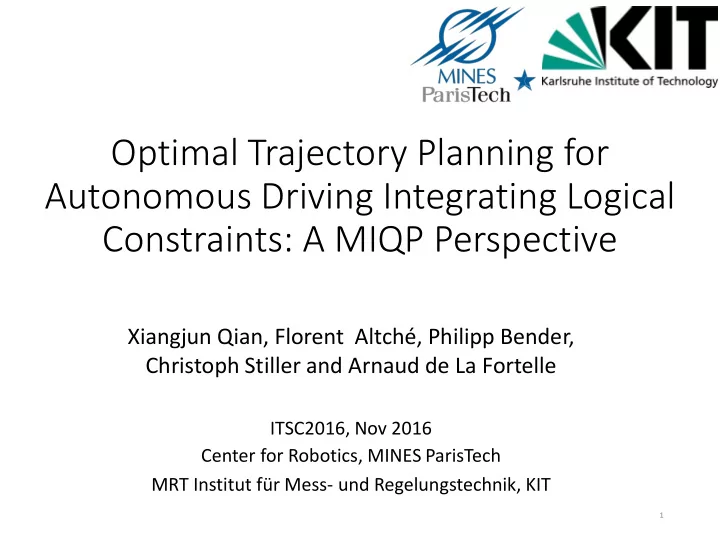

Optimal Trajectory Planning for Autonomous Driving Integrating Logical Constraints: A MIQP Perspective Xiangjun Qian, Florent Altché, Philipp Bender, Christoph Stiller and Arnaud de La Fortelle ITSC2016, Nov 2016 Center for Robotics, MINES ParisTech MRT Institut für Mess- und Regelungstechnik, KIT 1
Introduction Formulation Example Applications Conclusions 2
Sales, travel and fleet projections of autonomous vehicles 3 * T. Lidman, Autonomous Vehicle Implementation Predictions, presented in TRB 2015
Motion planning Generation of feasible (or preferably optimal) trajectories for autonomous vehicles w.r.t. certain performance index subj. to constraints raised from operation limits and the environment. 4 *A ride in Google car, acquired from youtube.
Motion Planning methods Sampling based methods Deterministic sampling: A*, State lattices Stochastic sampling: RRT, RRT* Optimization based methods: Model Predictive Control *Figures are cited from various publications: Ziegler et al, Werling et al, Xu et al, Frazzoli et al, Ziegler et al. 5
Optimization based methods Compute Generation optima trajectories w.r.t. certain performance index subj. to constraints raised from operation limits and the environment. 6
Optimization based methods Solvers: continuous and local methods like Interior-Point method, Sequential Quadratic Programming Advantage use gradient information to quickly converge to local optimum able to systematically handle various (continuous and differentiable) constraints 7
Logical constraints in on-road driving If the vehicle is on a speed bump, then its speed must be reduced to 40 km/h If the vehicle is approaching the exit of highway, then it must be on the exit lane If a vehicle is overtaking, then the ego vehicle must decelerate to facilitate it. Multiple maneuver variants *Figure from Bender et al 8
Can current motion planning algorithms handle logical constraints ? Sampling based approaches are by nature compatible with logical constraints, however, sub-optimal Optimization based approaches cannot handle dis-continuous or non-differentiable constraints can be trapped in local optimum Heuristic exists to approximate dis-continuous or non-differentiable constraints by nonlinear differentiable constraints or to initialize the solver near the presumably global optimum. However… Motivation for the development of a globally optimal algorithm capable of handling logical constraints 9
Linear point-mass model Assumption: the reference path is considered as straight in the prediction horizon of the MPC so that we can set the x-axis of the Cartesian frame as the longitudinal direction of the reference path Define State transition equation 10
Linear point-mass model Limit on heading Limit on yaw 11
Logic for driving Example: if the vehicle’s longitudinal position is between 30m and 50m, then its speed must be less than 10 m/s Formal description using propositional logic: 12
Logic for driving Associate binary variable to propositional logic predicates Big-M method: Logic constraints become mixed integer linear constraints 13
Mixed Integer Quadratic Programming (MIQP) Note that the cost function is quadratic and all constraints are linear, thus the problem is MIQP MIQP is NP while efficient branch-and-bound algo exist: CPLEX, GUROBI 14
Speed bump 15
Obstacle avoidance 16
Overtaking 17
Lane change 18
A new viewpoint for optimization-based trajectory planning using MIQP We consider logical constraints induced by traffic rules and multiple maneuver variants We formulate logical constraints as propositional logics and transform them into mixed integer inequalities We formulate a MIQP problem to find the global optimal trajectories under these constraints It can serve as a basis for cooperation among vehicles 19
Recommend
More recommend